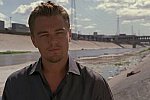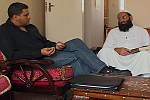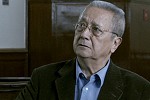 Shadows off the beaten path
Shadows off the beaten pathTERROR'S ADVOCATE | WE ARE TOGETHER
< < D O C S > >
last update 16.Mar.08
See also: SHADOWS FILM FESTIVAL
 R E V I E W B Y R I C H C L I N E
R E V I E W B Y R I C H C L I N E
 There's so much information jammed into this film that it's pretty overwhelming. It's strong, important stuff, and a less heavy-handed approach would make it far more engaging.
There's so much information jammed into this film that it's pretty overwhelming. It's strong, important stuff, and a less heavy-handed approach would make it far more engaging.
Even though the planet is sick, the environment will survive. But humanity may not. This is the starting point for a documentary about the state of the earth, examining human history over the centuries, as selfish activity has drastically altered the planet. We seem to forget that the natural world is our greatest resource as we plunder everything we can take. And over recent history, our most disastrous activity has had to do with the exploitation of an extremely limited amount of oil.
There are some intense statements here. Every living system on earth, without exception, is currently in decline. While nature continually recycles, never wasting anything, humans continue to pollute, destroy and degrade, and therefore head for extinction. Yes, it's a grim message, and it gets even gloomier when we see what's keeping us from turning things around: corporate greed and government inaction (usually due to corporate greed!). Essentially, it's the incessant striving for growth that has reduced the quality of life on earth. Environmental issues are merely a symptom of the sickness in our culture.
This is such a vitally important issue that it's a shame the film is so humourless and dense. Sharp editing, gorgeous cinematography and DiCaprio's snappy narration can't make up for the fact that we're worn out halfway through it. There's also the nagging problem that we have to completely reinvent our society if we actually want to reverse this situation. No amount of technological inventiveness will make up for the fact that powerful corporations refuse to allow change that might affect profits. And they make sure that no government can challenge them.
The solutions are obvious, but require leaders that are truthful and fair. Which, frankly, doesn't seem very likely. This is a compelling, haunting and extremely well-assembled film, but it leaves us feeling like our own personal actions are pretty pointless. And our most powerful tool, the vote, seems pretty useless as well when faced with such impotent candidates.
scr Nadia Conners, Leonardo DiCaprio
narr Leonardo DiCaprio
with Stephen Hawking, Mikhail Gorbachev, Ray Anderson, James Woolsey, Janine Benyus, Oren Lyons, Andy Revkin, Wade Davis, Wallace Nichols, Betsy Taylor, Paolo Soleri, David Suzuki
 release US 17.Aug.07,
release US 17.Aug.07, UK 21.Mar.08
07/US Warner 1h32
4.Feb.08
 R E V I E W B Y R I C H C L I N E
R E V I E W B Y R I C H C L I N E MUST
MUST  SEE
SEE
 This eye-opening doc reclaims the word jihad: it's a holy struggle, not a holy war. And as it examines the point where sexuality and Islam meet in seven very different cultures, the film becomes far more universal than we expect.
This eye-opening doc reclaims the word jihad: it's a holy struggle, not a holy war. And as it examines the point where sexuality and Islam meet in seven very different cultures, the film becomes far more universal than we expect.
In South Africa, the witty, thoughtful scholar Hendricks outlines his situation: married with children, but with a platonic male best friend. When he admits his inner struggle, he loses his job and gets death threats. In Egypt, Mazen is beaten and imprisoned for being gay, then flees to France as a refugee, where he befriends Sana, who was genitally mutilated in her home country, and the Egyptian lesbian couple Maryam and Maha. In Iran, Amir is so badly lashed that he escapes to Turkey, where he meets Arsham, Payam and Mojtaba and all four await UN refugee status. Also in Turkey, there are Kiymet and Ferda, who was forced to undergo a painful pregnancy. And in India, Qasim is told by his friend Ahsan that he'll have to marry if he wants to live correctly.
The people in this film are all devout Muslims, praying earnestly for a reconciliation between their faith and sexuality. Many feel they need to either leave Islam or commit suicide--there's no other option. They continually ask God why he made them like this and why he won't change them. Many have tried living straight lives, but they can't escape their deepest yearnings.
Honest and real (some won't let the camera show their faces), these people talk from their hearts. One observes that the only direct reference to homosexuality in the Quran (the Sodom and Gomorrah story) is actually about violence and rape, not sexuality. Another notes the "heavy silence" in Iran, which punishes gay men severely under Sharia law. And another says, "It will take longer than my lifetime for Islam and homosexuality to merge."
Amid this intense and sometimes dry material, there are also moments of strong humour and real joy, such as when Arsham and Payam reach their new life in Canada, or when Hendricks is invited to speak to Muslim social workers. The film is beautifully understated, showing scenes of people who are truly exploring their faith, feeling loved by God even when everyone else rejects them. Most maintain close family ties, even though they can't go home. And the overriding message is that all of us are on a similar journey: Islam commands everyone to learn, to find their way from cradle to grave, to discover that God isn't only to be feared, but that he's also a God of love.
with Muhsin Hendricks, Mazen, Sana, Maryam, Maha, Amir, Arsham, Payam, Mojtaba, Ferda, Kiymet, Qasim, Ahsan, Syed Kalbe Jawad, AK Hoosen, Abdellah Taia
 release UK Mar.08 llgff
release UK Mar.08 llgff07/UK C4 1h24
TORONTO FILM FEST BERLIN FILM FEST

4.Mar.08 llgff
 R E V I E W B Y R I C H C L I N E
R E V I E W B Y R I C H C L I N E L’Avocat de la Terreur
L’Avocat de la Terreur
 This rambling film bravely confronts an issue that couldn't be much more topical: treating suspected terrorists with dignity and respect. And its central figure is intensely fascinating.
This rambling film bravely confronts an issue that couldn't be much more topical: treating suspected terrorists with dignity and respect. And its central figure is intensely fascinating.
As a lawyer, Jacques Vergès defends unthinkable clients, including the late-1950s Algerian bombers, violent 1970s Palestinian activists and even Klaus Barbie in 1983. He was friendly with Pol Pot and Chairman Mao, had a thing for dangerous women and once vanished off the face of the earth for eight years. (He still won't say what he was doing.) He fully recognises that his clients are guilty of murder and oppression, but in each case he worked to prove how other people always shared the responsibility.
Through the film, Vergès chats openly about his cases--the public reaction, press coverage, the lynch-mob mentality. But he insists on acknowledging the fact that one person's terrorist is another person's freedom fighter. Despite some clients being sentenced to death, none was ever executed. As it progresses, the film also dips deeply into Vergès' private life, including his Vietnamese heritage, his conversion to Islam and his underground involvement with extremely shady characters.
Events he describes are illustrated with a wealth of archive footage, period interviews and to-camera comments from colleagues, friends and foes. Some talk about his passion and compassion, while others think he was a terrorist himself. It certainly seems that he had serious conflicts of interest.
The film is also a detailed chronicle of Islamic terrorism. And this is where the film takes a misstep, drifting off the central topic to provide firsthand accounts and news footage of the 1970s Palestinian operation during the years when Vergès was missing. This strong, revelatory material belongs in a separate film, because it's a draggy distraction here.
Overall this is gently confident filmmaking, using atmospheric settings and astonishing interviews with admitted terrorists, Nazis, members of the Stasi--all given an equal footing, with no judgement. In other words, Schroeder uses Vergès' even-handed approach in his filmmaking. And the result is a challenging and meaningful examination of justice and oppression that never lets us feel smug about our uprightness. Near the end, Vergès is asked if he would have defended Hitler. "I'd even defend Bush," he says instantly, "if he'd plead guilty."
with Jacques Vergès, Bachir Boumaaza, Siné, Magdalena Kopp, Lionel Duroy, Claude Moniquet, Neda Vidakovic, Anis Naccache, Patricia Tourancheau, Hans-Joachim Klein, Yacef Saadi, Oliver Schrom
 release Fr 6.Jun.07,
release Fr 6.Jun.07, US 12.Oct.07,
UK 16.May.08
07/France Magnolia 2h15
CANNES FILM FEST
TORONTO FILM FEST

12.Dec.07
 R E V I E W B Y R I C H C L I N E
R E V I E W B Y R I C H C L I N E Thina Simunye
Thina Simunye
 The subject matter elevates this documentary to something unmissable, as does the filmmakers' extremely personal approach. Although they can't resist appealing to our emotions.
The subject matter elevates this documentary to something unmissable, as does the filmmakers' extremely personal approach. Although they can't resist appealing to our emotions.
Slindile Moya lives at the Agape orphanage in KwaZulu Natal, home for 25 kids whose parents have died of Aids. Slindile is 12, and her family is split in two, with older siblings remaining in the family house, while the younger ones live at Agape. And two major things are happening in her life: the orphans are preparing to travel to London on a singing tour to raise funds for Agape, while at home her ill big brother Sifiso has just been diagnosed with Aids.
The extremely personal experiences of the Moya family give a moving frame for the events at the orphanage, where the founder "Grandma" runs things with wry humour and bracing honesty. She knows there are 1.2 million Aids orphans in South Africa, and that her home is a drop in the bucket, but she knows that maybe if they raise awareness and funds, they could expand to help a few more children.
Director Taylor spent nearly three years at Agape, and the resulting film is intimate and emotional, with rather a lot of time focusing on the gorgeous young children as they laugh, play and, yes, cry. And the film's strongest element is the music they create, from casual songs in the yard to lively recording sessions to the soaring concert performance alongside Paul Simon and Alicia Keys. Their energetic skill as vocalists is thrilling and extremely moving.
And there's also the profound sense that these kids know exactly who they are, and that they are not alone. Not only do they have a family around them, but they know their nation is in the grip of a terrible epidemic, and any small thing they can do will make a difference. So we can forgive Taylor for laying on the emotion so thickly, because he otherwise assembles this in a straightforward, observational style, catching the rhythms and personalities of children who vividly demonstrate the resilience of the human spirit. And that nothing can stop their hope for the future.
scr Slindile Moya, Paul Taylor
with Slindile Moya, Philisiwe Moya, Sifiso Moya, Nonkululeko Moya, "Grandma" Zodwa Mqadi, Zwai Bala, Thembelani Luwaca, Manu Ndlovu, Mthobisi Moya, Swaphiwe Moya, Alicia Keys, Paul Simon

release US 26.Apr.07 tff,
UK 7.Mar.08
07/South Africa HBO-C4 1h23
RAINDANCE FILM FEST
29.Feb.08


See also: SHADOWS FILM FESTIVAL
© 2008 by Rich Cline, Shadows
on the Wall
